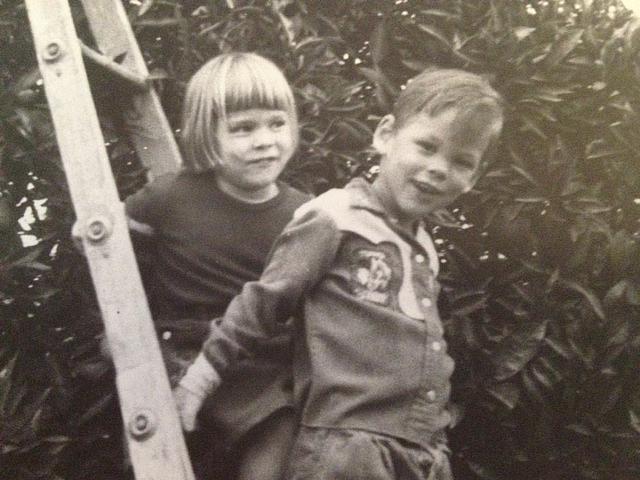A mother’s agonizing decision: Do I get tested for Huntington’s?

Mona Gable and her brother Jim as children.
If a blood test could predict your fate, would you take it? Would you want to know you were going to die a slow and horrible death?
Or would you choose to live in uncertainty and hope for the best?
In the fall of 2010, I was confronted with that agonizing question when my brother, who was dying of colon cancer, was suddenly diagnosed with Huntington’s disease.
By then, I’d written about health and medicine for many years. I had covered AIDS and heart disease, brain tumors and lung cancer, and many other conditions. I had profiled one of the most famous genetic scientists in the world. I had written about the BRCA breast cancer gene and the pros and cons of testing. In other words, I was fairly knowledgeable about diseases and the issues plaguing genetics.
Yet I knew almost nothing about Huntington’s, a fatal incurable brain disorder caused by a single mutant gene. I certainly had no idea that my brother had the disease. Or that I had a 50-50 chance of having the gene too. Or the most devastating fact of all: that if I did have the deadly gene, my children were at risk.
People with Huntington’s disease (HD), I was to learn, usually become sick in their 30s to 50s. The age of onset varies, but some of the early symptoms are depression, irritability and uncontrolled movements. Eventually, HD can lead to dementia. By the time my brother was diagnosed, he had gotten into countless car accidents. He could barely walk and his speech was so slurred I could barely understand him. He couldn’t feed himself.
Yet his diagnosis was hard for me to believe, and easy to deny. Huntington’s is genetic, passed down in families. But in our case where had Huntington’s come from? My parents had died years before; neither one of them of the inherited disease. But there was a reason that Huntington’s had seemingly appeared out of nowhere. In a tiny percentage of individuals with HD, there is no family history of the disease.
Another reason I was unaware of Huntington’s is because of the stigma that has gripped the disease. Many families used to hide HD for fear of losing their jobs and health insurance. Current estimates are that 30,000 Americans have HD, with more than 250,000 others at risk of carrying the lethal gene. But scientists like Dr. Michael Hayden who has studied the prevalence of HD believe the numbers are likely twice that, in part because doctors are recognizing it more. HD families are also becoming more visible and advocating for more federal research into the disease.
Although I was heartened by these developments, I still was left with the paralyzing question. Should I get tested? Since there aren’t any treatments that slow the progression of the disease, what good would it do to know? Since I was 54, and in good health and seemingly with no symptoms, maybe I was safe? Should I gamble?
There was something called a CAG repeat, reflecting letters of the genetic alphabet. This was critical. If you had a CAG repeat of 40 or higher, you developed Huntington’s. If the number was between 35 and 39, you might get Huntington’s—and your children were vulnerable, too. If the number fell in the 29 to 34 range, you were spared. But the next generation could still get the gene. The magic number was 28. Only then were you safe.
I thought of my children. At 18 and 20, they certainly had the right to know if they were at risk. It was horrifying to think that each of them could have the HD gene. In some families, all the children inherit it; in others none do. As a mother, my first instinct was to protect them, to avoid taking any action at all. But the side of me that cherished knowledge and revered science also wanted to be heard.
Yet if I did get tested, my son and daughter wouldn’t have to. I could spare them the anxiety and fear.
I decided to take the test.
In late January of 2011, I called the Huntington’s Disease Center of Excellence at UCLA and made an appointment with a genetics counselor.
Three years later, I’m glad I did.
Mona Gable is the author of a new short e-book called “Blood Brother: The gene that rocked my family,” which tells the story of her brother’s battle with Huntington’s and the outcome of her own decision to get tested. Read an excerpt from the book here.
